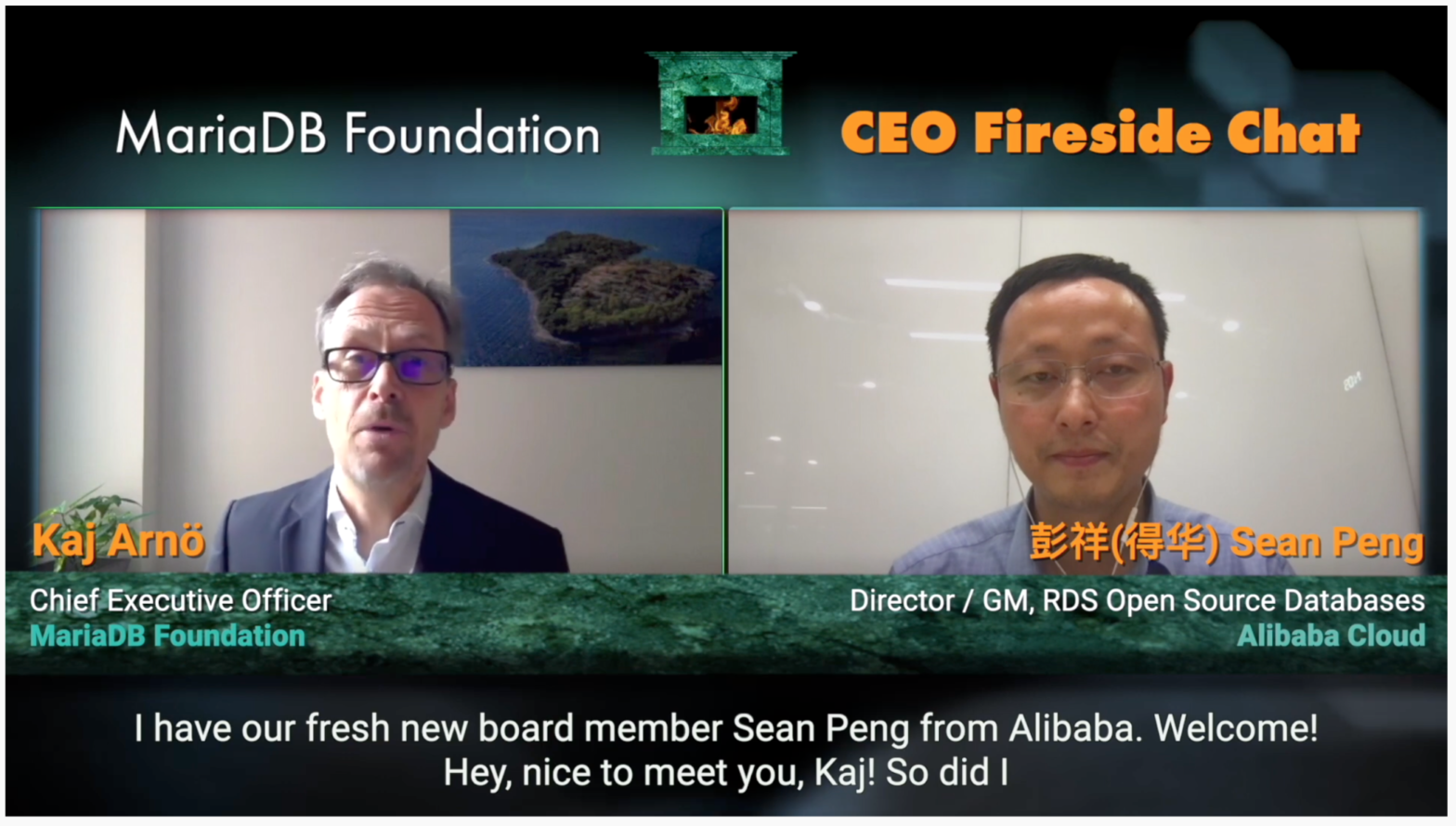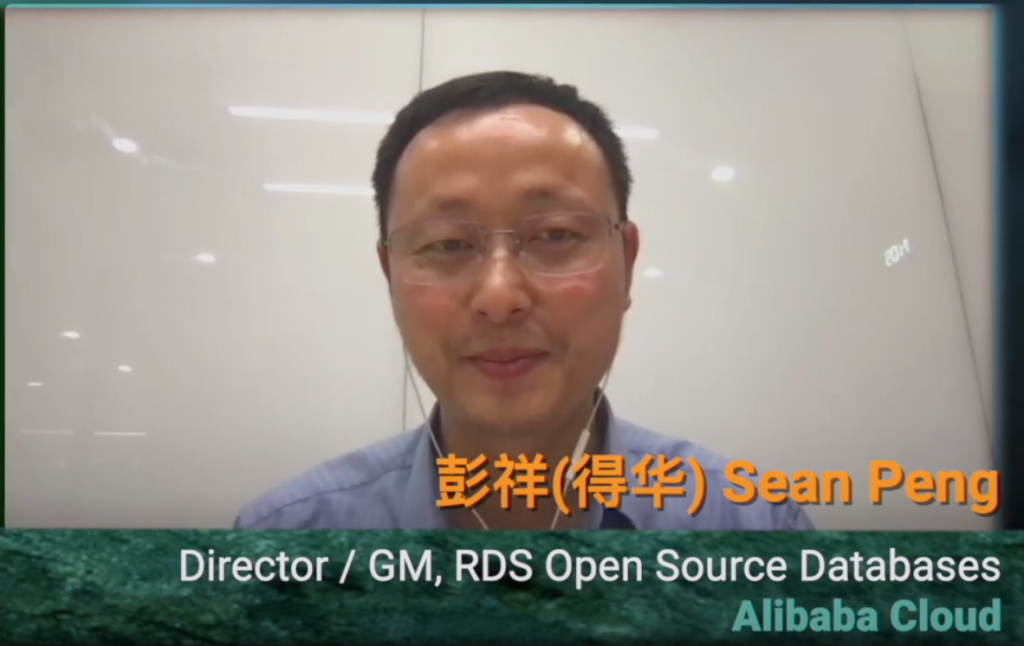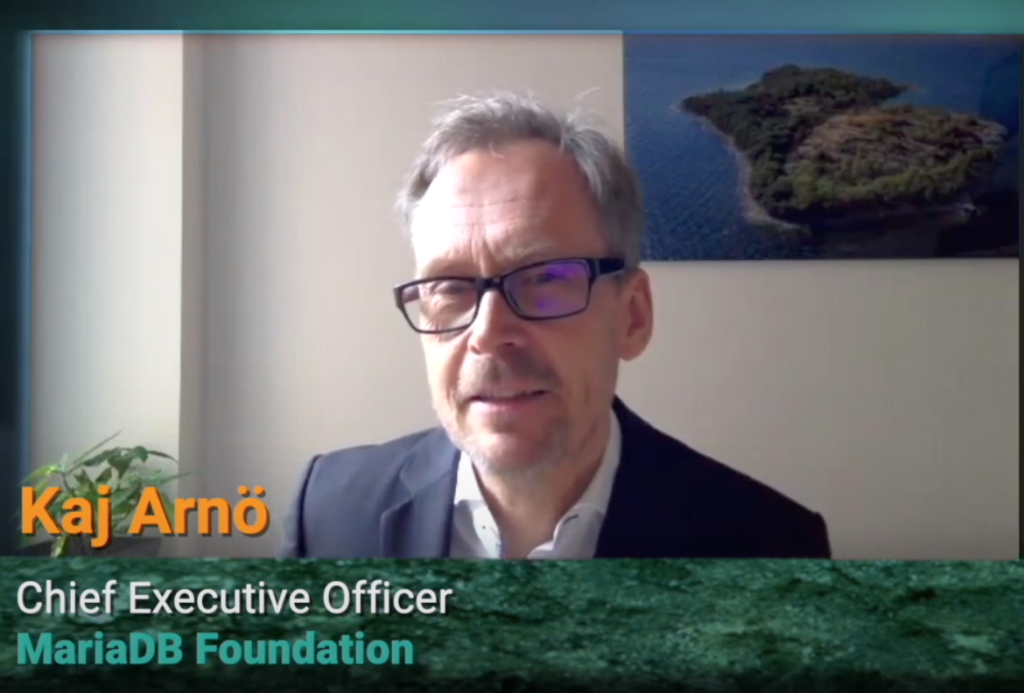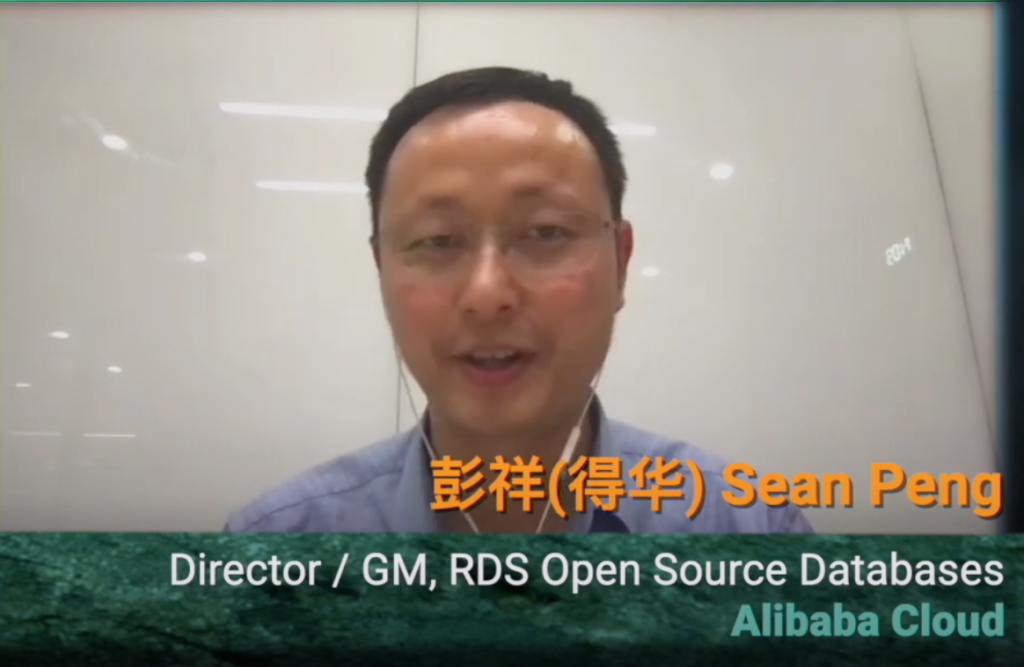China Has Great Potential for MariaDB Server

Our Board Meeting in April 2022 elected two seasoned new voting board members. One of them is Xiang Peng (Sean), Director, RDS Open Source Databases at Alibaba Cloud. I had the pleasure of having a Fireside Chat with him, which we recorded and put up on YouTube. Read on for his recommendations for MariaDB Foundation in China.
A Man With the Right CV for MariaDB Foundation
Sean, as he calls himself for those of us who have problems remembering, reading or writing his real name 彭祥, is a great resource for MariaDB Foundation.
First, he understands both his native China and the West, having graduated from University of Wisconsin at Madison and worked for ten years in the US.
Second, his first job was at Oracle in Redwood Shores, at the lake with the sailing boat – as part of the query optimiser team for Oracle Database.
Third, he worked for six years at AWS, on Aurora MySQL.
Now, he is back in Hangzhou, China, working at the Alibaba Headquarter, leading the engineering and product efforts for open source databases, including MySQL, MariaDB and PostgreSQL.
As you can imagine, this makes Sean uniquely positioned to guide MariaDB Foundation to make the right moves in China.

How is it like to be back in China?
Having got over the basics, I asked Sean whether he is happy being back in China?
“Yes! So, in two ways:”, Sean replies. “First, the internet and cloud computing has been booming in China. So I can do lots of interesting projects, which I don’t have the opportunity to do in the States. Second, family was the most important motivation to relocate from the US to China. With Covid, travel is suddenly challenging”.
Young Chinese engineers are fine with technical documentation in English
I then went straight for a core question, with which MariaDB Foundation has been struggling for long: How should MariaDB Foundation deal with the Chinese language?
I noted that as a European, it is important for me to serve the world in the language it expects, which isn’t always English. Within Europe, German is the biggest native language, but the French have higher demands on being dealt with in non-English. But that’s still nothing compared to China.
Trying to structure the question about how the MariaDB Foundation should deal with the Chinese language. To be specific, I separated the MariaDB world into “suits” and “techies”. My assumption was that the former, i.e. the managers, use mostly Chinese but that nearly all engineers are fine with reading technical documentation in English.
“I think that’s almost right”, says Sean. “But I would like to put a little bit of clarification on that front. There is a large user community and developer community for MySQL and MariaDB in China. I think that started to sell around 2000. That’s 20 years ago, when Alibaba and Tencent, all those internet companies were started. Compared with the younger generation of engineers, older generation of engineers have a slightly different education with less focus on English and little international exposure. And so, for the younger generation of engineers, there is no difficulty for them to read the MariaDB documentation in English. But for the senior managers, it’s always been a challenge for them to be as flexible with the English language as the engineers.”
So, how to better serve the market in Chinese?
I noted that MariaDB Foundation just got a contribution by Haidong Ji, with Chinese language error messages. So we do try to simplify life also for Chinese engineers. But my curiosity took me back to the question of how to improve the user experience for the Chinese.
Sean, now that you are a board member, how would you guide MariaDB Foundation in where we should put our efforts to better serve the Chinese market, from a language perspective?
“This is a very good question! First of all, the current open source database community is really good for MariaDB. Look at what has been going on for MySQL. There are new features such as Heatwave, but they are not open sourced and MariaDB is different from that. From my personal perspective, what we really should do is we need to grow MariaDB as a drop-in replacement for MySQL, if these two products are going to diverge in the future. That’s number one.”
“Number two”, Sean continues, “at least in Alibaba Cloud, we have invested heavily in open source databases. That includes MariaDB and MySQL. We in fact have database kernel developers for both MariaDB and MySQL. We are looking to contribute whatever fixes or new features we developed in MariaDB back to the community.”
“And number three: as I mentioned, in the past 20 years, there has been a lot of growth in China for MySQL. And we also have engineers who were previously members of the Server and InnoDB teams in MySQL and they have their personal connections to the developers in Oracle MySQL and MariaDB.”
This is a question close to Sean’s heart. He concludes: “From the marketing perspective, I would try to put more effort into migration scenarios, and new features to MariaDB on the cloud.”

We need the MariaDB Server Documentation Inside China
I persisted in getting into the specifics of how to better serve the Chinese market. How important is it to have what type of documentation or web presence in China? Given the Internet in China, a Chinese developer doesn’t have fast access to our website mariadb.org or the knowledge base. Sean, what’s your guidance there? Should we put a copy of the documentation inside China?
Sean’s reply is a resounding and eloquent Yes please: “In terms of making documentation more easily accessible by the community in China, I think that was a very good suggestion. That said, there is no firewall that blocks the users accessing the MariaDB website from China. There has always been a work around and people have been doing that all the time.”
“But the thing is, if we want to get in touch with a broad audience, it’s always beneficial to have a mirror website in China, where people can easily access the website. This way, they don’t need to get around the blocking between the China internet and the Internet on the outside. So it’s definitely going to help if we have a mirror website.”
“And especially for the starting engineers in the tech industry and also for the students in university, I’m specifically talking about the future MariaDB users and MariaDB developers. If we can have that website there, it’s definitely going to help MariaDB adoption in the future.”

But we don’t need the MariaDB Server Documentation in Chinese
Those were clear words. I also had another, related question: Should the documentation be made available – partly probably through Alibaba efforts – in Chinese?
“In terms of the language, I don’t think there is any necessity to have a Chinese version for documentation. For MariaDB, I think English is enough and I’m pretty sure English reading ability has long enough been a basic skill for an engineer career in China. So the engineers are expected to understand English and expected to read English technical documents.”
Getting such clear judgement from a Board member is very valuable for MariaDB Foundation, because from our perspective it is not easy to know the right answer. I have frequently travelled to China, and so has Monty, who as the creator of both MySQL and MariaDB is a demigod in China. But we both still have mere hunches. So it’s good to get, from the horse’s mouth, an honest opinion about this. So having a mirror in China is important! But not translating the entire documentation.
However, Chinese training materials would be valuable
Now that we were up to speed, I continued to probe into Sean’s ideas for localization:
What about training materials? I would have the perception that having training materials in English is good, but if there is something to be translated, I would rather translate the training materials than the entire documentation which is 3000 pages.
“Exactly! Exactly!” Sean replied enthusiastically. “So I can talk from personal experience: In the past year since I joined Alibaba, we have a user group for MySQL in China and we also have a user group for PostgreSQL in China. I don’t see a user group for MariaDB in China! So in terms of a training course or a workshop, I think that would be great.”
And so would a MariaDB User Group in China
Sean continues with his own initiative:
“I would suggest we try to establish a user group, a MariaDB user group, like, for example, ‘MUG’. It’s a very nice name! It’s a MariaDB User Group in China. Let’s just have the organisation. Of course, we need to attract the people – be it DBAs or users who are passionate about MariaDB Server and the MariaDB product. Let’s just grow the community and then we have meetups in different cities and on a regular schedule. That would be my suggestion, alongside the training or workshop ideas you have in your mind.”
I tried to sum it up. You would do three things: one is a mirror, so that you have easy accessibility. Two, you would do training materials in Chinese. And three, you would put effort into the user groups with visits in various places?
“Yes! Like I said, in terms of what the MySQL and the PostgreSQL users have been doing in China, the user group has been a very good model, to attract the user base and also help more people to understand and accept MariaDB.”
I wondered how we should think about physical presence? Now, we still have a bit of a pandemic going on and travel is not easy. And also, there’s a huge cost in travelling, both in time and in money. I asked Sean how he should distribute the effort? I mean, I understand that some travel is good and personally would like to visit Chongqing, the vertical city – but perhaps a lot can be accomplished with just a virtual tour?
“So that was a very good insight!” Sean says. “Even within China, there are lots of meetups or workshops or technical conferences. We have been doing that online, because the local governments sometimes have a lockdown or do something in order to prevent the virus from spreading. So I think before the Covid is gone, an online meetup would be a starting point.”

MariaDB is central to the Alibaba Cloud
I then moved to the cloud and Alibaba. Sean is an Engineering Director within Alibaba Cloud, currently leading Engineering, Product and Go to Market strategy for MySQL, MariaDB and PostgreSQL. So what does that mean in practice?
“We have the relational database service in Alibaba cloud.” Sean replied. “And it’s just a platform and we are providing MySQL service, MariaDB service and PostgreSQL service to our customers. In the past, our users and our customers had their own data center and they had their own databases, database process or database service running in their data center. It’s just much like what AWS and GCP and Azure have been doing. We have our own RDS service and we have been investing heavily in the open source databases, that is MySQL, MariaDB and PostgreSQL.”
“MariaDB is unique among these three services. As I mentioned, in China, most of the internet companies have been growing alongside MySQL and this is different from US or European technical communities where almost half of the people go to MySQL and maybe another half go to PostgreSQL. But in China almost ninety percent, maybe more than that, have been using MySQL.”
I know that cloud companies are fairly secretive about statistics and numbers. But it’s also a very interesting question: What can you reveal about statistics? Like numbers of servers, numbers of users, anything that gives us a grip on how big this is?
“First of all, thank you for your understanding!” Sean said, smiling at my wording about secretiveness. “What I can see is that the MariaDB adoption rate has been fairly … Let me put it that way, there is a great potential for MariaDB in China and East Asia! That’s the only thing I can put on the table right now, okay: Great potential for MariaDB!”
Where does the MariaDB related Alibaba code go?
Then, I proceeded to ask another technological question, unsure of whether it’s touchy or not. When you develop stuff, how much do you devote your work towards developing the server code base to optimise it for the cloud, and how much on the surrounding scripts like Kubernetes and such? So what’s the engineering part of your work? Where does it end up, the code?
“Ah, that’s a very good question!” Sean replied. “So, I would put it as this: 80% goes to the infrastructure where we do the instance management and we do the Kubernetes related work, where probably 20% goes to the optimization of MariaDB Server. Bug fixes, sometimes we do hit bugs which are not fixed in the community and also some handy DBA functions where customers say, hey, I want that functionality – can you just put it in your database service? We sometimes do that. So yes, I think it’s 80% versus 20%.
Can Alibaba help MariaDB Foundation with Kubernetes?
In this 80 % area, we’re doing nearly nothing in the MariaDB Foundation. We’re concentrating on the server, but we have started a project to create a basic Kubernetes operator. I imagine that any cloud provider has lots and lots of operators and very much complexity there. I’m not certain that it would even be possible for Alibaba to contribute back their Kubernetes scripts and I believe that a cloud provider wouldn’t want to do that anyway. But is there anything Alibaba can do from an adoption perspective, to guide us and work with us in in creating, shall
we say, a baseline Kubernetes operator?
Sean replies: “Yes, that is a very good question. Here, I would say that what we have been doing here has been exclusively for the public cloud. We do have complex and powerful infrastructure. The Kubernetes operator stuff that you have been describing is what the end users or customers want to do on top of whatever infrastructure they might have.”
“What I want to emphasise is that these two different models are complementary with each other. They’re not replacements of each other. So in order to increase the adoption or make it more popular in the MariaDB community, I think it’s good to have a Kubernetes and container related infrastructure for MariaDB.”
Sean continued: “We can collaborate in the training courses or the workshop we talked about. There we just let people know when you want to set up your MariaDB service. You can have this option to do that yourself, so that would be my suggestion.”

Sean and his Board Position
With Sean now elected a voting Board Member of the MariaDB Foundation, I’m personally very much looking forward to working with China in general and Sean in particular. I am curious to know, what are Sean’s plans for this role as a board member?
“There are three points in my mind. First, I would like to try my best to work with the Board and to make sure MariaDB is as open as it is now. I would like to keep it that way.”
“Number two, I would like to use this opportunity to combine what we have been doing here in Alibaba and also what we have been doing in China, where we can increase the popularity and adoption for MariaDB.”
“Third, I would like to involve the developers in Alibaba to contribute back to the community and grow together with the community. So that would be the three things that I would do to make sure MariaDB is heading in a healthy direction.”
That is like music to my ears, because all of those three things are very well aligned with the MariaDB Foundation mission, as we have stated it – with Openness, Adoption and Continuity.
So, with those words: Thanks a lot for this interview, Xiang Peng!
“Thank you very much, Kaj! It was nice talking to you!”
: )
That’s Alibaba, the top IT company in China.